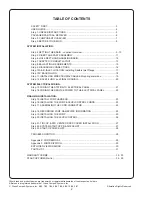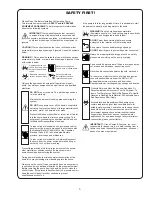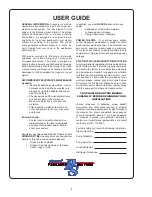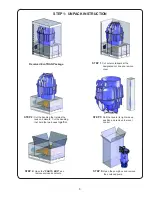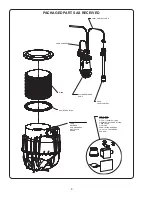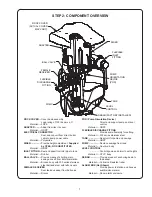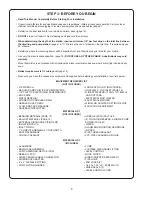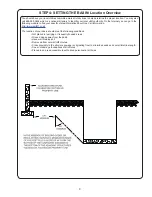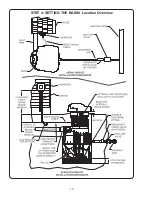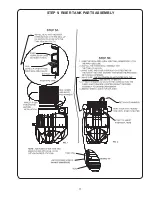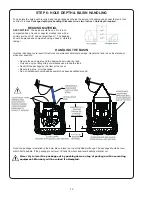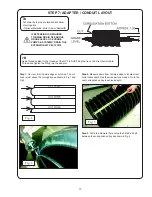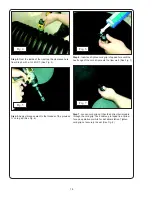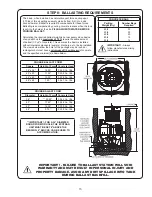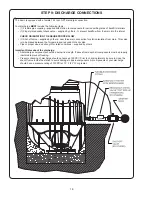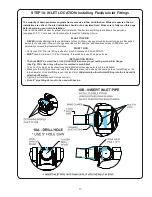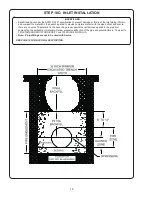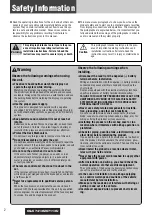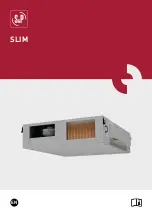
3
Please Read This Before Installing Or Operating Pump.
This information is provided for
SAFETY and to PREVENT
EQUIPMENT PROBLEMS
. To help recognize this information,
observe the following symbols:
IMPORTANT!
Warns about hazards that can result
in personal injury orIndicates factors concerned with
assembly, installation, operation, or maintenance which
could result in damage to the machine or equipment if
ignored.
CAUTION !
Warns about hazards that can or will cause minor
personal injury or property damage if ignored. Used with symbols
below.
WARNING !
Warns about hazards that can or will cause serious
personal injury, death, or major property damage if ignored. Used
with symbols below.
Only qualifi ed personnel should install, operate and repair
pump. Any wiring of pumps should be performed by a qualifi ed
electrician.
DO NOT
drop or roll basin. This will damage unit and
void the warranty.
Minimize the amount of cooking grease entering the
system.
DO NOT
leave pump cover off the basin, except while
servicing, to prevent entrance of foreign materials such
as rocks, metal, soil, animals or humans.
Prevent infi ltration or direct fl ow of rain or run-off water
into the pump basin to minimize pump cycling. This
will prevent overloading the treatment facility, and will
facilitate swift transportation of sewage.
To reduce risk of electrical shock, pumps and control
panels must be properly grounded in accordance with
the National Electric Code (NEC) or the Canadian
Electrical Code (CEC) and all applicable state,
province, local codes and ordinances.
To reduce risk of electrical shock, always disconnect
the pump from the power source before handling or
servicing. Lock out power and tag.
Prevent large articles of clothing, large amounts of chemicals,
other materials or substances such as are uncommon in
domestic sewage from entering the system.
During power black-outs, minimize water consumption at the
home(s) to prevent sewage from backing up into the house.
Always keep the shut-off valve completely open when system is
in operation (unless advised otherwise by the proper authorities).
Before removing the pump from the basin, be sure to close the
shut-off valve. (This prevents backfl ow from the pressure sewer.)
Keep the control panel locked or confi ned to prevent
unauthorized access to it.
If the pump is idle for long periods of time, it is advisable to start
the pump occasionally by adding water to the basin.
WARNING!
Do not pump hazardous materials
(fl ammable, caustic, etc.) unless the pump is specifi cally
designed and designated to handle them.
DO NOT
wear loose clothing that may become
entangled in the impeller or other moving parts.
Keep clear of suction and discharge openings.
DO NOT
insert fi ngers in pump with power connected.
Always wear appropriate safety gear, such as safety
glasses, when working on the pump or piping.
Cable should be protected at all times to avoid punctures,
cut, bruises and abrasions - inspect frequently.
Never handle connected power cords with wet hands.
To reduce risk of electrical shock, all wiring and junction
connections should be made per the NEC or CEC
and applicable state or province and local codes.
Requirements may vary depending on usage and location.
Products Returned Must Be Cleaned, Sanitized, Or
Decontaminated As Necessary Prior To Shipment, To
Insure That Employees Will Not Be Exposed To Health
Hazards In Handling Said Material. All Applicable Laws
And Regulations Shall Apply.
Bronze/brass and bronze/brass fi tted pumps may
contain lead levels higher than considered safe for
potable water systems. Lead is known to cause cancer
and birth defects or other reproductive harm. Various
government agencies have determined that leaded
copper alloys should not be used in potable water
applications. For non-leaded copper alloy materials of
construction, please contact factory.
IMPORTANT! -
Crane Pumps & Systems, Inc. is not
responsible for losses, injury, or death resulting from a
failure to observe these safety precautions, misuse or
abuse of pumps or equipment.
SAFETY FIRST!
Hazardous fl uids can
cause fi re or explosions,
burnes or death could
result.
Biohazard can cause
serious personal injury.
Rotating machinery
Amputation or severe
laceration can result.
Hazardous voltage can
shock, burn or cause death.


